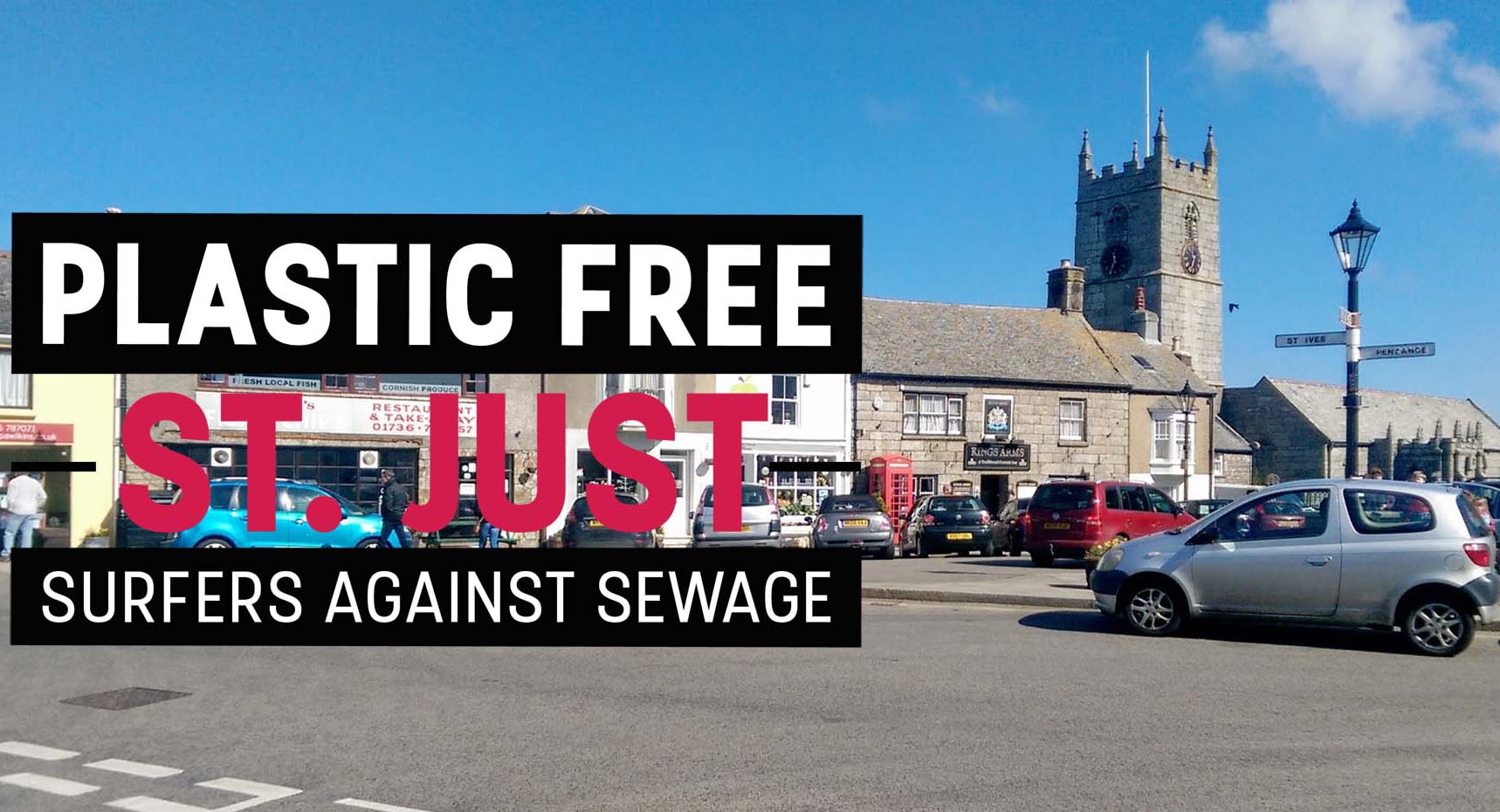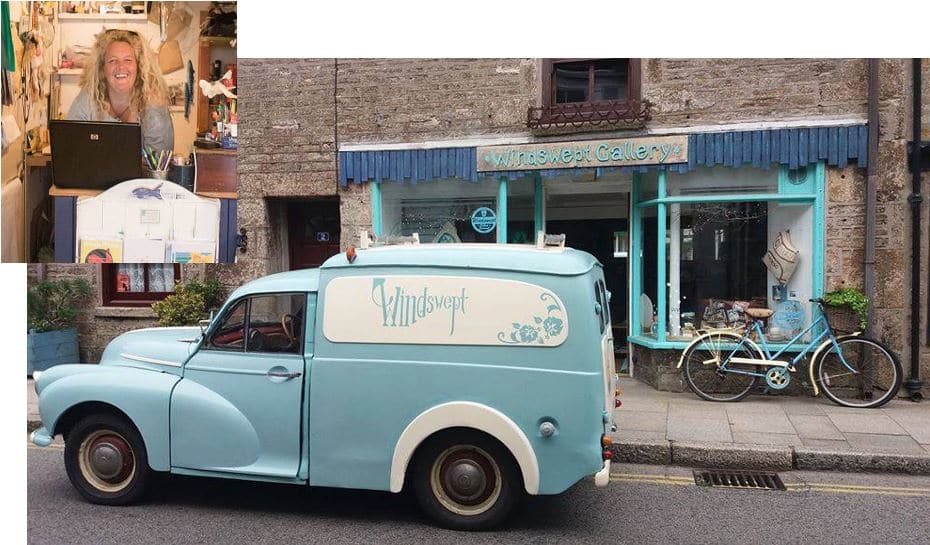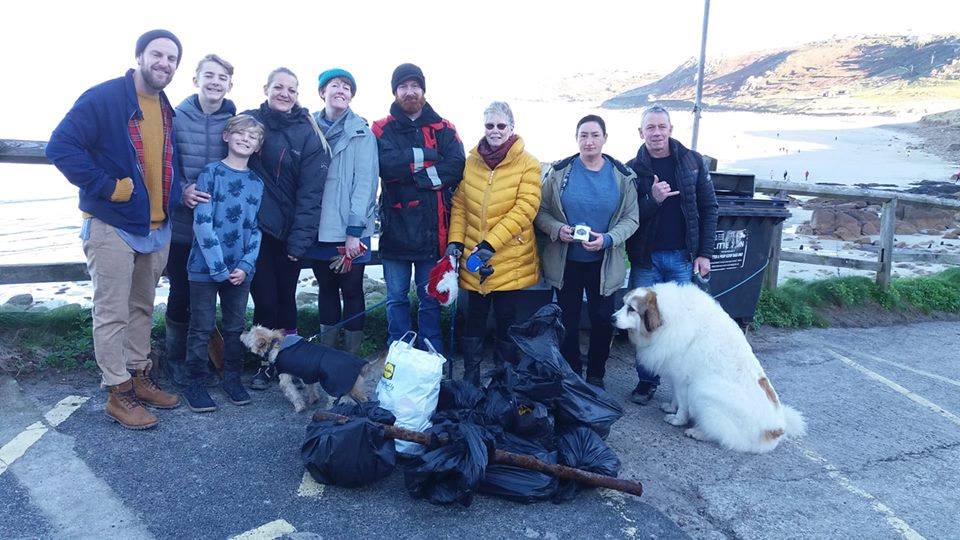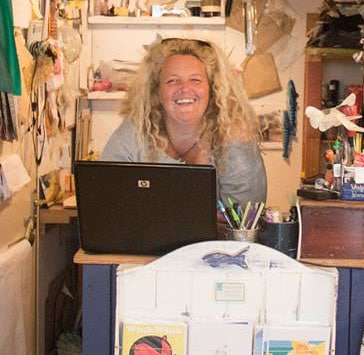Marine Life & Conservation
Proud of my local town, St. Just, Penwith

St. Just in West Penwith is not a true coastal town as it lies a few miles inland. But being Cornish, wherever you are, the sea is a great influence in our daily lives. It gives us our weather, our culture, our work place and our great sense of well being. The sea inspires our leisure time, our art and encourages our health. Our beautiful north and south coasts are a wondrous sight and change their mood throughout the year from serene splendour to uncontrollable rage. They are full of an undefinable energy which energises the human soul.
St. Just cares about the sea and it cares about the environment. That is why it recently, in association with Surfers Against Sewage (SAS), became a plastic free town. I’m sure that very few of us are happy with the way our environments are being polluted and probably often complain about it. Well here is the answer. Just get up and do something.
A driving force behind Plastic Free St.Just is Allie Scott, owner of Windswept Gallery. I asked her how this all came about.
Jeff: Hi Allie. Many congratulations to you and St.Just on becoming a plastic free town. Can you tell me what exactly this means?
Allie: Thanks… Basically, in short, this means that as a town we have made a commitment to limiting the amounts, and if possible eradicating, the use of single use plastics. This goes for businesses, local governance, schools, community venues and groups as well as local residents.
Jeff: Is this status recognised nationally by any governing body such as central government or local councils?
Allie: It is. It’s all part of a Government acknowledged scheme, started by SAS, where local Councils across the country acknowledge this as a standard to be achieved in a bid to begin to tackling the problems that single use plastics present. If you see a business displaying the Plastic Free Champion sign, you can be assured that they are taking steps to minimise their consumption and supply of single use plastics.
Jeff: What percentage of the St.Just population and businesses needed to support this to make it a true plastic free town?
Allie: The amount required varies per population, From the 2011 census, St.Just had a population of 5,000, but this has grown since. We had to gain the support of at least six businesses and we are at present at 24 and still growing. Also half of its community spaces, and a third of its schools (we have all three). We have more than this and people are still signing up to join in. This will never stop growing… any business that wants help and advice as to how it can achieve the status is guided through the process and helped in any way possible. This is a long term process… Rome wasn’t made plastic free in a day.
Jeff: What made you decide to do this?
Allie: As a business we have been plastic free for nigh on 25 years; I have never liked to think that something we have produced could and would have a negative impact on the planet. When the scheme came about I asked around the town and there seemed such great and positive support for it so I thought “why not”… It’s great to think that the ethos that our gallery has had for all these years has now been shared with so many. Also as we surf locally and beachcomb most days for materials for our creations we definitely have seen first hand the rise of plastics washing up on our shores. When you are faced with it like that, and see marine animals and birds washed up and harmed by it, it’s hard not to want to do more.
Jeff: Have you always been aware of environmental issues or is this relatively new found with the plastic contaminations?
Allie: No it’s definitely not a new thing for us, Before we moved here we were Environmental Contractors specialising in inner city nature areas and conservation, using traditional skills to manage the environment, so it’s been something we have done for about 30+ years.
Jeff: Have you had full support from the entire community of St.Just or have there been local objections and barriers?
Allie: There have been no objections or barriers but there are still a few people not joined up and that’s fine… they will get there in the end. On the whole though the support has been fantastic and 90% of people and businesses are well onboard, but most importantly the young are involved via schools and youth groups. They then in turn influence their families to hopefully make a few more better informed choices.
Jeff: You mentioned how schools and youth groups have really got behind the project and are supporting it fully. Can you tell me more about this?
Allie: Well all of our schools have signed up to be Plastic Free Schools and part of this, apart from them just cutting down on their own plastic consumption, is that they get involved with writing to Local and Central Government and large businesses requesting that they too start to do something about the amount of plastics there are out there and maybe they could start to develop an alternative that won’t do the damage that plastics do. Also local cub/scout/brownie/guide groups have joined in with beach cleans and are joining in with the pledge to cut plastics, and as soon as they all start up again I shall be approaching the local surf clubs to do the same .
Jeff: Living all my life in and around the sea, I personally have been witness to the insipid build up of plastic waste in our oceans and shores since I began diving over forty five years ago. When did you first fully become aware of how serious the problem was and was there a defining moment?
Allie: I’m not sure there ever was a ‘light bulb’ moment, but there was a definite time when we realised whilst we were out there collecting driftwood for our furniture making we were suddenly picking up more plastics than wood… That was a tad depressing. When we first started about 20 years ago, you would find the odd piece and you would think…oh that’s interesting…that’s come all the way from, say, China…. but then you start to realise that it’s getting more and more and it’s no longer the odd piece. There has also been a rise in dead and injured marine life… and that’s never a nice thing to find.
Jeff: Are there any other towns or cities in Cornwall who are following your lead or have gone before you?
Allie: Well Penzance was the official first Plastic Free Community. But there are many, many more, in fact SAS had to change the campaign from Coastlines to Communities as so many inland towns wished to sign up. There are now 444 (both accredited and working towards accreditation) official Plastic Free Communities all over the country…. we were about 25th I think.
Jeff: Do you think becoming Plastic Free has changed or added value to St Just ?
Allie: I’m not sure… it has brought us together for a common goal whereas before we were a town with many individual businesses, all doing their own thing… but now people are sharing their ideas and suppliers and in some instances bulk buying together, so that’s really great to see. St Just has always been a tight community and now it’s one that is proud of what it has achieved. We are very much ‘living on the edge’ here… both figuratively and literally, so that tends to unite you in ways other places probably don’t understand. I also like to think that maybe visitors will be encouraged to visit safe in the knowledge that we are a town that cares for its local environment as well as the wider world, so I think that can only be for the good.
Jeff: What’s the next stage?
Allie: I would love to get the bigger companies in my area signed up… I’m currently working with our local Co-Op in a bid to get them more plastic aware. We also have a large pasty producer, but to be fair, they aren’t too bad, but there are still a few steps they could take. Other than that, its more beach cleans, more businesses signing up and more raising of awareness to the problem. We shall carry on producing our wares from reclaimed, recycled and sustainable materials, wrapping in paper, and treading as lightly as possible, hopefully with the odd surf thrown in.
Jeff: What advice can you give to someone who wants to go plastic free ?
Allie: Do it! Everyone thinks that someone should do something about this problem… well guess what… that someone starts with you. If you, even on your own, start to look at the choices you make everyday then that’s a great start… But do get others involved… maybe become a community leader for the Plastic Free Communities Campaign (just go on the SAS website for details). Ask your friends, colleagues, club members, school mates to do it with you. I used to get quite down about the problem, but then as I decided to get the community involved I was very heartened by how many other businesses were trying to do their bit too. It’s not hard and it can be fun. People used to say to me… what’s the point? What difference can I alone make? Well, if 1 million people stop using take away coffee cups and use a keep cup, then that’s 1 million less cups in landfill… it soon adds up. We don’t have endless time to sort out this problem… we have to start now and stop adding to the disaster that is out there and of our making in the first place. Then, and only then, will future generations have a chance.
Jeff: Thanks Allie. Please do keep me informed about events and beach clean-ups.
Allie: Thanks for asking and being interested in what we do, and feel free to join us for the next beach clean… details on our Facebook pages…Windswept Gallery or Plastic Free St Just.
Marine Life & Conservation
Paul Watson Released as Denmark Blocks Japan’s Extradition Bid

Renowned anti-whaling activist Paul Watson has been released from custody in Greenland after spending five months in detention. Denmark’s Justice Ministry rejected Japan’s request for his extradition, citing insufficient guarantees that his time already served in custody would be credited against any potential sentence.
The 74-year-old Canadian-American was arrested on July 21 in Nuuk, Greenland’s capital, when his ship docked to refuel. His arrest was based on a 2012 Japanese warrant related to a 2010 encounter in Antarctic waters. Japan alleged Watson obstructed operations and caused damage to a whaling research ship during efforts to disrupt illegal whaling. Watson has consistently denied these claims, maintaining his commitment to marine conservation.
Denmark, which oversees extradition matters for Greenland, concluded that while the legal conditions for extradition were met, the lack of assurances from Japan regarding time-served credit made extradition untenable.
In a video shared by his foundation, Watson expressed gratitude and relief, saying, “After five months, it’s good to be out… and good to know they’re not sending me to Japan.” He added that the most difficult part of his time in custody was being separated from his two young sons.
Watson is a pioneering figure in marine conservation, known for founding the Captain Paul Watson Foundation in 2022 after decades of activism with the Sea Shepherd Conservation Society. His bold efforts to defend marine life have earned him widespread support, including from celebrities and conservationists. His work has also been featured in the acclaimed reality TV series Whale Wars.
Watson’s lawyer, Jonas Christoffersen, praised the decision, stating, “We are happy and relieved that Paul Watson is now free.” He added that Watson is eager to reunite with his family and continue his vital work.
The arrest occurred while Watson’s vessel, the M/Y John Paul DeJoria, was en route to the North Pacific with a team of 26 volunteers to intercept a Japanese whaling ship. His foundation described the arrest as politically motivated and emphasized that Watson’s actions were focused on ending illegal whaling practices.
Japan resumed commercial whaling in 2019 after leaving the International Whaling Commission, asserting that whale meat is a cultural tradition. Conservationists, however, continue to challenge these practices, highlighting their impact on marine ecosystems.
Despite the challenges, Watson remains steadfast in his mission to protect marine life and bring attention to whaling practices. His dedication to ocean conservation has made him a globally respected advocate for the environment.
Marine Life & Conservation
12 Days of Zero-Waste Fish-mas

This holiday period, the Marine Conservation Society, the UK’s leading ocean membership charity, invites you to make some simple changes to eating fish this Christmas to help our seas.
Dr Kenneth Bodles, Head of Fisheries and Aquaculture at the Marine Conservation Society, said, “During the festive season, our consumption increases, but so does waste. Sustainability isn’t just about where food comes from – it’s also about how you use it. By reducing waste and making the most out of your seafood, you’re not only taking steps to be more ocean-friendly, but can also help to cut costs during what is often one of the most expensive times of the year”.
The Marine Conservation Society has compiled twelve tips on how to consume seafood sustainably with zero-waste this Christmas:
Buy whole fish instead of fillets
Instead of fillets, consider buying whole fish such as salmon, hake, or lemon sole. By adopting a “nose to tail” approach with cooking, whole-baked fish not only feeds a crowd, but also helps to minimise waste and maximise sustainability by using up every part of the animal, including bones, skin, and fat.
Make fish stock
Leftover fish bones or shells can be put to good use by boiling them to make a nourishing fish stock or bisque. This can be frozen and preserved for later use and makes for a flavourful base in a soup.
Make your own fish pâté
Avoid waste by turning leftover fish, such as smoked mackerel or salmon, into a delicious pâté by blending with cream cheese and lemon. Perfect when paired with crackers.
The sustainability of salmon and mackerel varies depending on where and how it is caught or farmed. For more information on green-rated options, check the charity’s Good Fish Guide.
Buy frozen
By purchasing seafood that is frozen or vacuum-packed, this helps to reduce waste by extending the shelf life of your food.
Fish pie
If you’re wondering what to do with leftover cooked fish, why not opt for a classic fish pie with mashed potatoes, leeks, and a cheesy sauce? A sure crowd pleaser on Boxing Day.
Use the head
Don’t forget the fish head! The meat is incredibly tender and flavourful. The charity recommends a cod’s head curry or recreating Fallow’s renowned cod’s head in siracha butter.
By stretching your ingredients further, not only is this a more sustainable way to enjoy seafood, but also cost-effective by repurposing leftovers and cooking creatively.
Boxing Day brunch
Mix leftover kippers or smoked salmon with scrambled eggs for a tasty, zero-waste, Boxing Day brunch.
For best choice, make sure you buy kippers, or herring, from the North Sea and the North Irish Sea.
Zero-waste storage
A top tip from the Marine Conservation Society to avoid waste is freezing fish offcuts to save for future use.
Crisp up the skin
Even leftover fish skin can be turned into a quick savoury snack by crisping it up in an air fryer with a little olive oil and salt.
Anchovies two ways
Leftover anchovies can either be blended with butter to make a delicious anchovy butter or tossed into pasta for a hit of umami flavour.
The charity recommends opting for anchovies caught in the Bay of Biscay for best choice.
Fishcakes
For an easy, zero-waste meal, leftover seafood trimmings can be mixed with mash and fried in breadcrumbs to make fishcakes.
Pickled mussels
Try pickling mussels in 1:1 vinegar and water, with a dash of sugar for a sustainable, zero-waste snack that can be enjoyed well beyond the festive season.
Mussels farmed in the UK are a seafood superhero. Grown using low-impact methods and harvested by hand, they get all the food they need from the sea around them. This makes them one of the most sustainable, ocean-friendly, and cost-effective seafood options.
Players of People’s Postcode Lottery have raised £6.6M towards the Marine Conservation Society’s vital work in making seafood more sustainable.
Laura Chow, Head of Charities at People’s Postcode Lottery, said: “Fish is a festive favourite for many, but making sustainable choices when it comes to how we buy and eat seafood makes all the difference for our ocean. Support from players of People’s Postcode Lottery has helped the Marine Conservation Society further its sustainable seafood work, so that we can all enjoy healthier, better protected seas.”
The Marine Conservation Society encourages you to make sustainable seafood choices a year-round habit, not just for Christmas. To check how sustainable the seafood on your plate is, you can visit the charity’s Good Fish Guide. The Guide helps consumers and businesses identify the most sustainable seafood using a simple traffic light system, based on where and how species are caught or farmed. Green is the best choice, amber means improvements are needed, and red indicates fish to avoid buying.
Zero-waste gift idea
Why not embrace a zero-waste Christmas by gifting a membership to support marine conservation? It’s a meaningful, low-waste gift that helps protect our ocean for generations to come. Memberships start from as little as £5 a month – the price of a sandwich and drink from your local coffee shop.
Find the latest sustainable seafood advice for wild-caught and farmed seafood on the Good Fish Guide, downloadable to your phone from www.mcsuk.org/goodfishguide.
-

 News3 months ago
News3 months agoIconic SS United States to become the World’s Largest Artificial Reef
-

 Blogs2 months ago
Blogs2 months agoScubaverse Christmas Gift Guide 2024: Day 4
-

 Blogs2 months ago
Blogs2 months agoScubaverse Christmas Gift Guide 2024: Day 1
-

 News2 months ago
News2 months agoSanta Divers take the Plunge for Charity
-

 News3 months ago
News3 months agoDiscover Turquoise Divers and Media Luna Beach & Dive Resort: A Premier Diving and Relaxation Destination in Roatan
-

 Blogs2 months ago
Blogs2 months agoScubaverse Christmas Gift Guide 2024: Day 5
-

 Blogs2 months ago
Blogs2 months agoScubaverse Christmas Gift Guide 2024: Day 2
-

 News3 months ago
News3 months agoToucan Diving at Plaza Beach and Dive Resort Bonaire Introduces PADI Mermaid Training


















